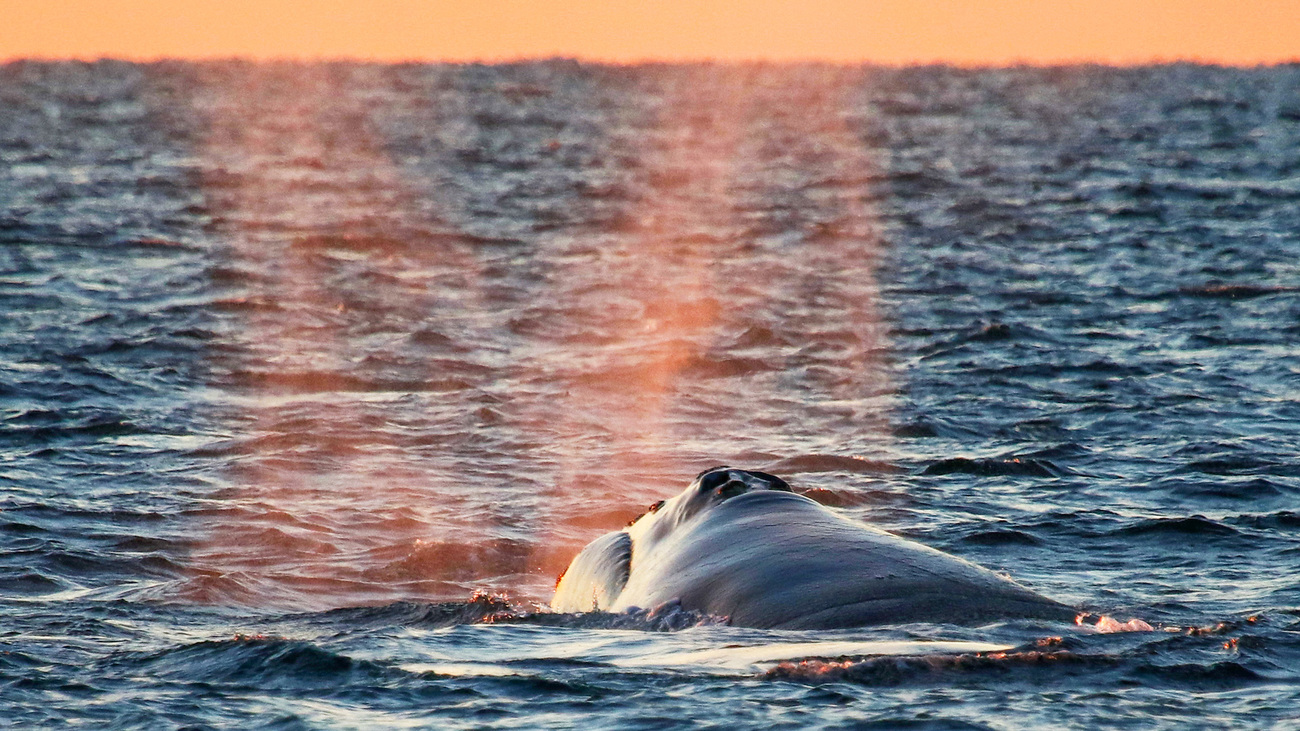Saving the North Atlantic right whale - North America
Don't fail our whaleResearch expedition reveals greater protection needed for the critically endangered North Atlantic right whale
Research expedition reveals greater protection needed for the critically endangered North Atlantic right whale

New findings address data gaps and highlight the urgent need for expanded protections to prevent species’ extinction
(Washington, DC – 15 October 2024) – The latest report reveals new insights into North Atlantic right whale behavior, distribution and habitat use that send a stark message about the urgent need for more effective and expanded protection measures.
The report, R/V Song of the Whale: 2023 North Atlantic right whale surveys, was released today by IFAW drawing on data from its commissioned research project aboard the Song of the Whale, a purpose-built whale research vessel.
“Right whales face numerous hazards as they migrate from calving grounds off the US Southeast to feeding grounds in the US Northeast and Canada,” said Kathleen Collins, Senior Marine Campaign Manager at IFAW. “IFAW’s Song of the Whale research project conducted visual and passive acoustic surveys along the Eastern Seaboard, aiming to fill data gaps and better inform conservation efforts to help save this species from extinction.”
With only around 350 individuals left, including fewer than 70 reproductive females, the North Atlantic right whale is listed as critically endangered on the IUCN Red List. IFAW’s 2023 expedition aimed to better understand the presence, distribution, and health of the species, but also confirms two key threats - vessel strikes and fishing gear entanglement - remain chronic issues throughout the whales’ habitat.
“What we know is that every individual North Atlantic right whale matters. This research has given us a window into their world, revealing new insights into their movement patterns, health, and the persistent threats they face,” said Collins. “With our findings, we are advocating for stronger protections and innovative solutions to safeguard this iconic species before it’s too late.”
Project findings and impact
Over a span of 15,781 kilometers of survey effort between January and November 2023, Song of the Whale recorded 25 North Atlantic right whale group sightings, comprising at least 32 individual whales, and including two mother-calf pairs. The team conducted both visual and acoustic surveys, with several different right whale vocalizations detected, ranging from upcalls to gunshots and variable frequency sweeps.
Acoustic surveys were particularly vital for detecting whales, given their elusive nature. Many right whales were detected in previously under-surveyed areas, helping to fill crucial data gaps.
“These whales are venturing into new regions, likely due to climate change and shifting prey patterns,” Collins explained. “This means they are moving into areas without existing protections, increasing their vulnerability to vessel strikes and entanglement. This is why the work of Song of the Whale was so important - it revealed where urgent action is required.”
Ongoing threats
The research findings highlight two primary, ongoing threats: vessel strikes and fishing gear entanglements. Despite existing seasonal management areas (SMAs) requiring vessels to reduce speeds in critical right whale habitats, IFAW’s research recorded whales in waters where these protections were either absent or insufficient.
“Our data shows that North Atlantic right whales continue to face high risks, especially from fast-moving vessels near major ports,” Collins stated. “While current speed regulations are helpful, they are not enough. We need more comprehensive and dynamic management zones to account for the changing distribution of right whales.”
In addition to vessel strikes, entanglement in fishing gear remains one of the leading causes of death for North Atlantic right whales. The team’s findings include detections of right whales within and outside protected areas designed to reduce entanglement risks. This reinforces the need for innovative solutions, such as on-demand fishing gear that eliminates the need for vertical buoy ropes.
Looking ahead
The Song of the Whale research underscores the urgency for updated and expanded protections to safeguard the North Atlantic right whale. IFAW is calling on policymakers and the public to support stronger measures, including stricter speed limits for vessels, mandatory dynamic management zones, and the adoption of on-demand fishing gear.
“Our research provides compelling evidence that protections need to be expanded and enforced, particularly in areas where North Atlantic right whales are spending more time year-round,” said Collins. “If we are to save this species, we must act now by implementing stronger, science-based policies that reduce human-induced threats.”
IFAW remains committed to working with scientists, policymakers, and communities to ensure the survival of the North Atlantic right whale and will continue advocating for necessary changes to protect this critically endangered species from extinction.
// ENDS
Notes
Imagery can be found via hightail HERE.
The project was funded by the International Fund for Animal Welfare. Contributors include Marine Conservation Research, NOAA’s Northeast Fisheries Science Center, Stellwagen National Marine Sanctuary Team, Anderson Cabot Center for Ocean Life, Center for Coastal Studies, Duke University Marine Geospatial Ecology Lab, and Duke University Marine Lab. All work was conducted under NOAA permits 21371-01 and 24359).
Press contact:
Stacey Hedman
Senior Communications Director, Global Programs
m: +1 508 737 2558
e: shedman@ifaw.org
Related content
Every problem has a solution, every solution needs support.
The problems we face are urgent, complicated, and resistant to change. Real solutions demand creativity, hard work and involvement from people like you.